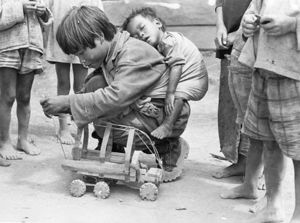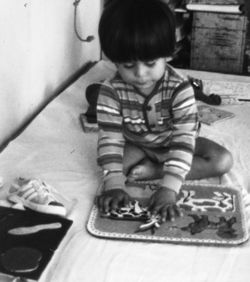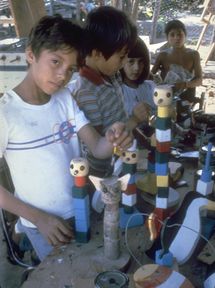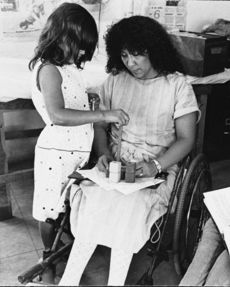Hesperian Health Guides
Chapter 49: A Children’s Workshop for Making Toys
 |
| Children often design and make excellent toys. This child from Vietnam puts the last touches on his homemade truck. (Photo: UNICEF/Jacques Danois) |
Another way that village children can contribute to a rehabilitation program is by helping to make special toys for babies and children with disabilities.
In Project PROJIMO in Mexico, village children help out in this way—and enjoy doing it. In addition to the toys that this voluntary “labor” produces, it also brings together children with and without disabilities in a creative work-play relationship.
 |
| Animal puzzles, like this one made by village children, help a child learn to use his hands, and to match shapes. (PROJIMO) |
At first the children at PROJIMO made toys in the same workshop where the adult workers with disabilities were busy making braces, wheelchairs, and other orthopedic equipment. But soon things got too crowded. The children often played while they worked (which is natural), and a few important tools got broken or “lost.” While there were advantages to letting the children work in the same shop with skilled craftspersons, the team finally decided to create a separate “children’s workshop” equipped with its own basic tools.
In this workshop, children are invited to make educational and useful toys —“useful” in the sense that they help with a child’s early development, providing stimulation, exercise, use of the senses, and learning of skills.
As the children or adult workers become more skillful at making toys, some can be sold to help bring in money to the workers or program. Some of the toys and dolls made at PROJIMO are sold to visitors. In Jamaica, young people with disabilities run an economically successful factory, making wooden toys. Toys made at the Life Help Center for the Handicapped, Madras, India, are sold world-wide.
PROJIMO has an agreement with the children. The first toy they make is for the rehabilitation center or for a particular child with disabilities. The second toy they make they can take home for a younger brother or sister. In this way PROJIMO and the school children also contribute to the development of children without disabilities in the village.
 |
 |
| School children making toys. | Mari, one of the rehabilitation workers at PROJIMO uses one of the child-made toys to test the ability of a girl who is developmentally delayed. |
Another advantage to the children’s workshop is that it provides experience, fun, productive activity, and skills training for visiting children with disabilities. Thus a child who needs to spend a few days in the village, while a brace or limb is being fitted or a joint is being straightened, can spend part of his free time in the workshop.
The orthopedic workshop is not strictly off-limits for the children. Occasionally a child who proves to be a responsible and serious worker will be allowed to help in the “adult workshop”—perhaps helping to make crutches, braces, special seats, and other orthopedic equipment. But to gain working privilege in the big persons’ shop, a child must usually first prove himself in the children’s workshop. This helps reduce problems. But, of course, some problems do occur—as with any community action that is worthwhile.
Guiding and coordinating the children’s workshop (we prefer “guiding” to “supervising”) is an important job. It can be shared by different persons: rehabilitation workers, volunteer village craftspersons, or even some of the older, more responsible children as they gain experience. What is most important for such a coordinator is (a) that she like children, (b) that she be able to provide direction and keep order effectively without being bossy, and (c) that she be very patient.
Whether parents of visiting or local children with disabilities are invited as coordinators or helpers in the children’s workshop can be decided depending on the particular parent and child. Some parents do a fine job. It may be an opportunity for a parent to relate to and work with his child in a completely new way. However, some parents may continue to overprotect and over-direct their own child or other children in the workshop. Many children need a chance to do and make things with other children independent of their parents’ supervision or help. For such children, it may be best not to ask their parents to be present in the workshop.


